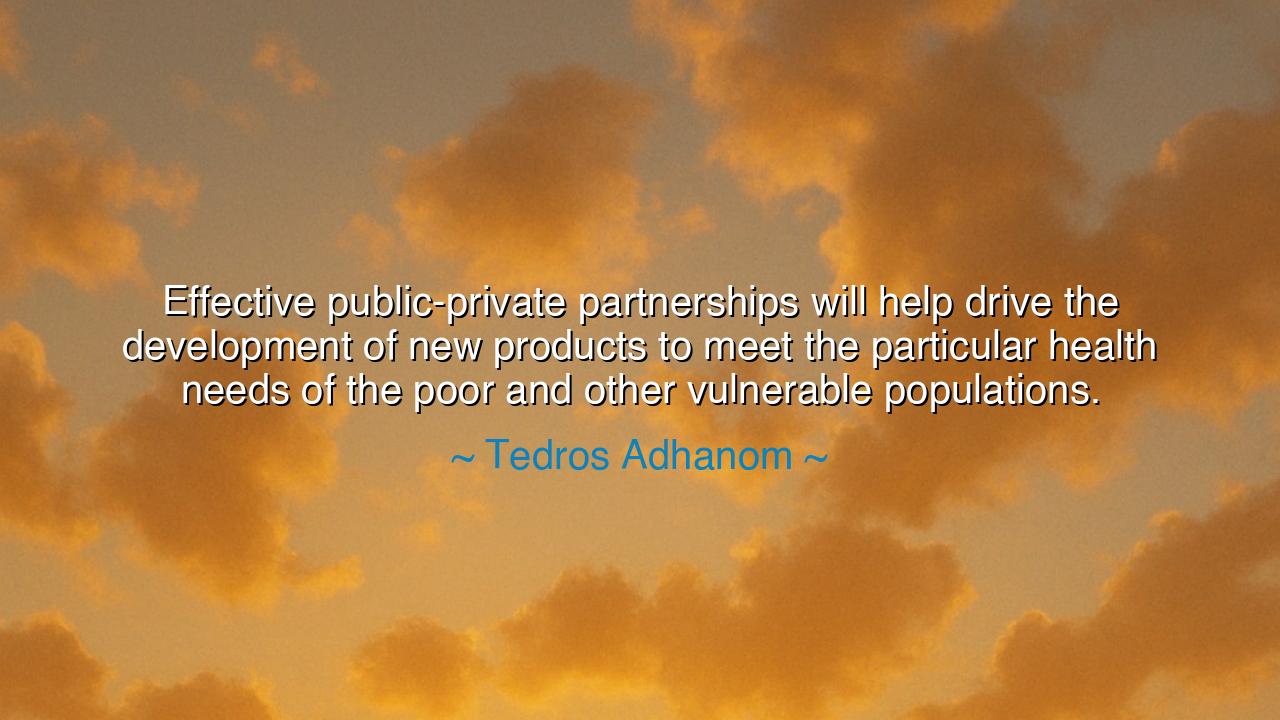
Effective public-private partnerships will help drive the
Effective public-private partnerships will help drive the development of new products to meet the particular health needs of the poor and other vulnerable populations.






In the voice of Tedros Adhanom, the healer of nations and steward of global health, there resounds a truth both pragmatic and profound: “Effective public-private partnerships will help drive the development of new products to meet the particular health needs of the poor and other vulnerable populations.” Though spoken in the language of policy, these words carry the weight of moral vision. For they remind us that the fate of humanity depends not only upon compassion, but upon cooperation—that the power to heal the world lies not in isolated efforts, but in the uniting of strength, knowledge, and will across every boundary.
In ancient times, the wise kings and councils of the earth knew that the harmony of a realm was sustained by collaboration between its pillars—the farmer, the healer, the craftsman, the sage. When each worked alone, famine and sickness spread; but when they labored together, the harvest was abundant and the people flourished. So too in our modern age, public-private partnerships are the new assemblies of civilization. They are the bridges between compassion and innovation, between the mission of the state and the power of enterprise. For neither government nor commerce alone can heal the world’s wounds—but together, their joined hands can forge solutions worthy of humanity’s highest calling.
The words of Tedros are born of experience, not abstraction. As a physician and as the leader of the World Health Organization, he has stood in the places where inequality breeds disease, and where medicine’s miracles remain out of reach. He has seen how the poor and vulnerable suffer not for lack of cures, but for lack of access, for lack of investment, for lack of unity. His vision calls upon both the might of the public sector—governments, universities, and institutions of service—and the ingenuity of the private sector—companies, inventors, and entrepreneurs—to join forces, not for profit alone, but for human survival.
There is a story, real and radiant, of such unity in action: the battle against polio. Once, this disease crippled children across the globe, a shadow haunting every parent’s heart. It was through the partnership of nations, charities, and corporations—public will entwined with private resource—that vaccines were produced, distributed, and administered in the most distant villages of the world. The Global Polio Eradication Initiative, a union of governments and organizations like Rotary International and pharmaceutical companies, became a testament to what mankind can achieve when purpose outweighs pride. And so, a disease that once struck millions has been reduced to but a whisper in a few corners of the earth.
Tedros Adhanom’s wisdom speaks to this very spirit: that progress is not born of isolation but of interdependence. The poor, the forgotten, the ones living at the edge of the world—they are not merely recipients of aid but the measure of our civilization’s conscience. When partnerships arise not from ambition but from empathy, not from rivalry but from unity, then innovation becomes justice, and science becomes compassion. This is the true meaning of his call: to use the machinery of modern progress as a tool for mercy, and to turn the engines of wealth toward the service of the weak.
But this path demands humility and vision. The public must trust the private; the private must honor the public. Governments must see beyond bureaucracy, and corporations beyond profit margins. Both must remember that their purpose is not merely to build wealth, but to build well-being—to create medicines, technologies, and systems that heal the wounds of inequality. For in a world as interwoven as ours, the sickness of one is the sickness of all, and only together can the healing be complete.
Therefore, let this truth be passed to all who seek to serve the greater good: cooperation is the highest form of wisdom. When the farmer shares his field with the healer, when the inventor shares his discovery with the poor, when the ruler opens his treasury for the good of the many, the world itself is renewed. Let every nation, every business, every citizen ask not only, “What can I gain?” but, “Whom can I heal?” For in lifting others, we lift ourselves; in serving the vulnerable, we strengthen the whole.
And so, the lesson endures: that partnership is power—not the power of domination, but the power of compassion magnified by unity. Let us, in our time, be the builders of bridges, not walls. Let us forge alliances not for profit, but for purpose. And in doing so, may we fulfill the dream spoken by Tedros Adhanom—that every human being, rich or poor, known or forgotten, may share in the blessing of health, and that through unity, the spirit of humanity itself may be healed.






AAdministratorAdministrator
Welcome, honored guests. Please leave a comment, we will respond soon